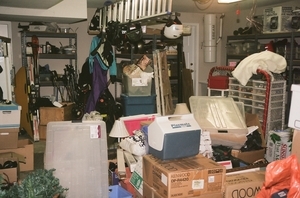 Why is that we set boundaries around so many areas in our life but let our stuff take over our space and effect our quality of life? How many times do you trip over the same pile of shoes at the front door day after day or open a closet door and hope that nothing falls on your head? How much time do you waste looking for your keys every morning or are late for work because you couldn’t find anything to wear that morning?
Why is that we set boundaries around so many areas in our life but let our stuff take over our space and effect our quality of life? How many times do you trip over the same pile of shoes at the front door day after day or open a closet door and hope that nothing falls on your head? How much time do you waste looking for your keys every morning or are late for work because you couldn’t find anything to wear that morning?
Time to De-clutter Stuff!
Enough already of the insanity and stress of too much stuff! How many iPods do you really need? Stop checking your email all day long. How many shoes hurt your feet when you wear them? What clothes sit in your closet that you haven’t worn in the last 18 months? What about all the books piled on your night stand and the piles of magazines collecting dust. And how about all those greeting cards, keepsakes and sentimental items. And what is disorganization costing in your office?
According to an organization study done by Office Depot in 2006:
- 76% report losing time to disorder
- 61% claim the biggest frustration with their disorganized environment is that they can’t find what they need quickly
- 53% live in “controlled chaos” where their desk is a mess but they claim to know where everything is located.
- 51% are concerned about missing important deadlines or appointments
- 27 percent of professionals said they find it hard to concentrate with messy files around
- 16% fear of diminishing their reputation
- 14% lose business opportunities due to disorganization
So why is it that only 22% actually spend the time to organize their desks, physical and electronic files, to increase their productivity every day? The study goes on to say that only 49% set aside time organize on a monthly basis and approximately 67% are not sure how to start or maintain their organizing systems.
I’ve gathered some interesting statistics on the cost of clutter and disorganization in time, money and quality of life. Seriously consider what clutter and chaos is costing you in your home and/or business. It can be a real eye opener when you calculate the cost associated with your chaos and disorganization. It opens your eyes to the additional stress you may be putting on yourself and others, or how unproductive you are in your business. If you’re disorganized it effects your quality of work, your co-workers, your customers and family members. Disorganization has a ripple effect but often times we don’t slow down to access the real costs.
Clutter really is stuck energy and it stops you from moving forward. Clutter also attracts dust and grime which in turn affects the quality of the air you breath in every day. The effects of clutter, chaos and disorganization impacts your life and those around you more than you may want to admit. All good reasons to de-clutter your stuff. Mental clutter is another area that shows up in your physical space. If you have a cluttered mind, often times, your space is cluttered too.
The good news is you may only need to spend a few days or a few weeks to be more organized and then the quality of your life improves, your productivity soars and new opportunities may even open up for you. 3M survey says that individuals rank ‘getting organized’ in the top 5 items for their New Year’s resolution. So, how are you doing with your New Year’s Resolutions? If you need some help, we have many resources, videos, organizing bootcamps and consultants to help you de-clutter your home and office.
Take a few minutes to review the Organizing and Time Management Statistics and check off the ones that apply to you.
Then find your calendar and schedule time to de-clutter stuff in your office and home. Start with the area that is driving you crazy the most.

